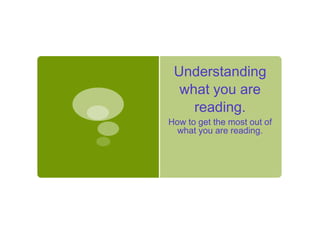
Power point presentation with pictures
- 1. Understanding what you are reading. How to get the most out of what you are reading.
- 2. In order to be successful: You must be able to understand what you are reading. Take time when you are reading. Read for content. Use a graphic organizer to help you remember information.
- 3. PLOT What is happening in the novel/book. The events that occur. There can be more than one plot in a novel/book.
- 4. CONFLICT Conflict is part of the plot, there can be more than one conflict as well. Conflict is the struggle in the book Conflict can be internal (within) a person Conflict can be an external (outside) struggle with somebody other than himself. Example could be the world, nature another person, or religion.
- 5. CHARACTER The people that are doing the action in a book. Every character is different and unique. The reader develops an understanding/impression of the characters in a book. Characters are responsible for the action in a book.
- 6. POINT OF VIEW How the story is told. The manner in which the action/information in a book is explained to the reader First person: the narrator (person telling the story) is a character present in the book. Third person: the narrator is outside of the story, people are referred to as he or she.
- 7. TONE The tone is the feeling of the book. It's how the author makes you feel when you're reading a book. Used to create emotions and feelings.
- 8. SETTING The time, place, physical descriptions of people, places and things in a book. Provide descriptions that allow the reader to make mental images/pictures in your mind.
- 9. THEME The main topic, subject, or concept the author is trying to point out.
- 10. What is a graphic organizer? A visual display that is used to explain relationships between terms and ideas. Provides a visual picture and allows the relationships/ correlations to be made. Very useful when reading to create outlines for papers and assist with processing and remembering information.